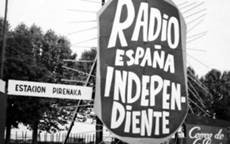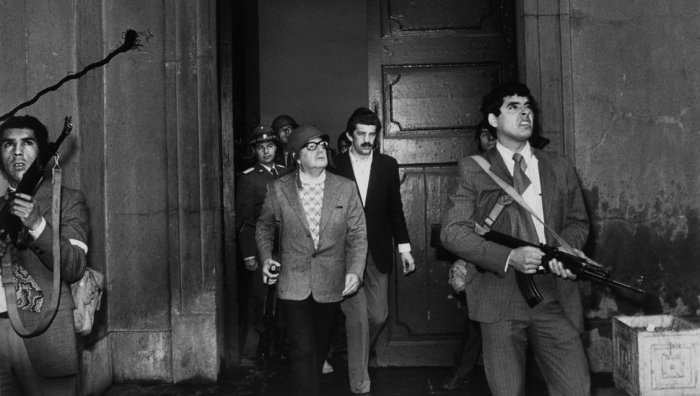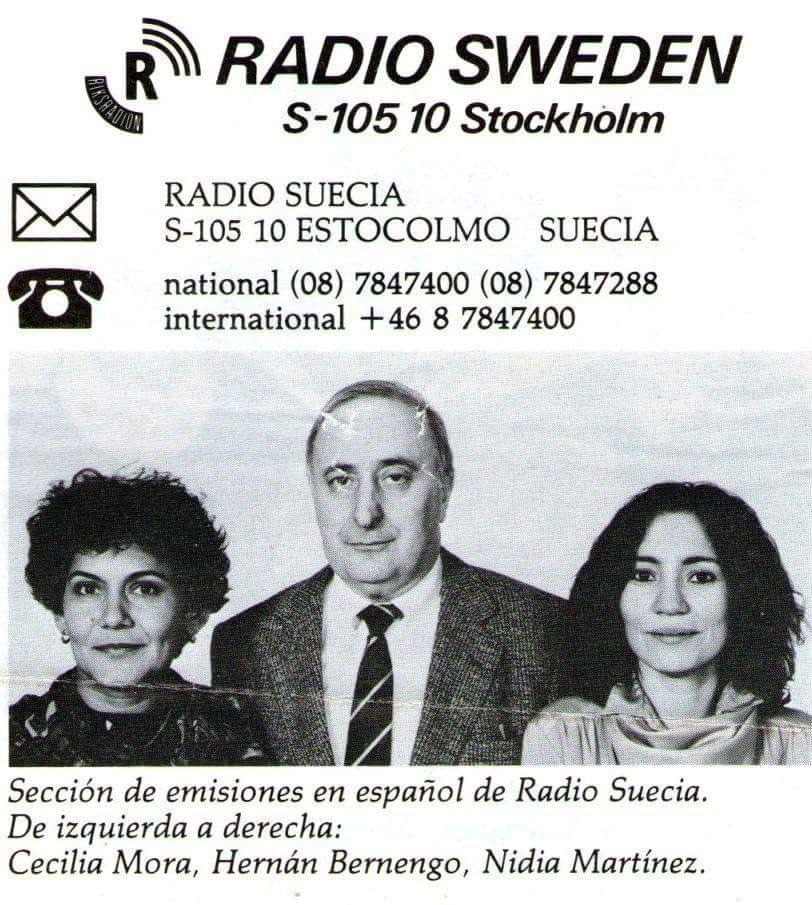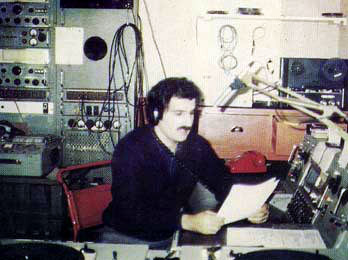Marking a century of Argentine broadcasting is a perfect occasion to remember some sounds...
These memories take us back to familiar voices and melodies reaching us through a Noblex Carina receiver, or a Spica receiver, whose leather case had a smell that, just by closing our eyes, we can remember perfectly.
But as it always happens, there is another story behind all of this.
The story of radio used as a political tool. It's the radio of crisis, conflict and war. It's a radio that you don't listen to loudly and in the morning in the kitchen, but you listen to it, hiding in the dark and with headphones.
There is another radio. The radio that we lived in danger.
Whoever wants to hear, let them hear.
The Pirenaica
After the Spanish civil war, an anti-Franco station run by the Communist Party of Spain came on the airwaves: Radio España Independiente, known as "La Pirenaica", since it was implied that its antennas were located somewhere in the Pyrenees. It was on the air for 36 years, between 1941 and 1977.It actually broadcast from the Soviet Union and then from Romania, with antennas always aiming at Spain. There were almost 108,000 propaganda broadcasts whose scripts are stored in more than 3,000 volumes, including thousands of letters that listeners covertly sent to mail addresses located in Western European countries that were constantly changing to avoid reprisals from Franco's dictatorship. La Pirenaica’s programs, which were heard at night and at low volume, included speeches by La Pasionaria or Santiago Carrillo, interviews with Rafael Alberti or Joan Manuel Serrat.

The World of Che
It has been a while since Radio El Mundo stopped being what it was. However, back in 1958 one of its journalists, Jorge Ricardo Masetti, traveled to Cuba to interview Fidel Castro and Ernesto Guevara in Sierra amid the revolutionary war. Their voices were practically unknown to the general public until then. Obtaining those interviews was an event of such magnitude that Rodolfo Walsh deemed Masetti's work as the most important feat of Latin American journalism. That material, due to different circumstances, was not transmitted in full because it was lost, so the envoy of Radio El Mundo from Buenos Aires decided to return to Sierra Maestra and redo the interviews, which could then be listened in Argentina and other countries of the continent, especially Cuba via Radio Rebelde, the mythical station founded by Che Guevara that is still on the air.
Chile Listens
On September 11, 1973, one of the best radio soundbites was aired, if not the best: president Salvador Allende's last speech, aired by Radio Magallanes. The address’s transmission, recording, rescue and copying is a cinematic story that demonstrates the importance of studio operators.
That same night, the transmissions of Escucha Chile began. It was a program made by Radio Moscow that, every night, until the last day of the Pinochet dictatorship, brought to Chileans the voice of solidarity. Its audience level was very high and the popularity of "La Mosca" as it was known in Chile was based on the fact that programs covered local current events in detail, despite being broadcast from more than 15000 kilometers away.
One of the best kept secrets to make this possible in times when there was no internet or other technology, was the operation of a clandestine journalistic team operating in Buenos Aires. From a newsroom in the Argentine capital, this group of journalists led by Isidoro Gilbert was the "Buenos Aires Connection" of Escucha Chile, acting as bridge and link, and generating special content for those transmissions coming from the USSR.

The Montoneros in Costa Rica
In 1979, the Montoneros organization decided to set up a SW station in Costa Rica. It was called Radio Noticias del Continente (News of the Continent) and it transmitted with antennas oriented to our country, on the 31-meter band, despite constant intentional jamming by transmitters in Argentine territory. The radio station played a vital role in El Salvador, airing the last mass and immediate murder of Monsignor Arnulfo Romero. It also aided the Sandinista Front in Nicaragua to coordinate actions.
There are numerous declassified documents that indicate how concerned was the Argentine dictatorship with these transmissions. The characteristic ID theme that identified Radio Noticias del Continente was an instrumental version (on guitar) of the Peronist March, performed by musician Adrián Goizueta (son of Oscar Casco, a famous figure of the golden age of Argentine radio). There were two terrorist attacks on the station carried out by Nicaraguan Contras and agents of Argentina’s military intelligence. One of the actions was dropping an explosive device from a plane that did not go off. Eventually, the station’s broadcast licence was revoked by the Costarican authorities.
Radio Sweden tells us what's going on 15 blocks from home
During the last dictatorship, the claws of censorship reached across the Rio de la Plata all the way to CW1 Radio Colonia in Uruguay, and listeners lost the chance to listen to news that weren’t reported back home, voiced by Ariel Delgado, who would use his famous line: THERE IS MORE INFORMATION FOR THIS BULLETIN. And that's where the Noblex 7 Mares and the Tonomac Super Platinum SW receivers come in. Both with their maps and short wave bands so that, just by turning the dial, we could take a tour of the world on radio. And breaking through censorship barriers we could listen to Spanish language radio services, and find Mercedes Sosa on Radio Nederland, or the Mothers of Plaza de Mayo interviewed on Radio France International, or Julio Cortázar writing a radio play at the request of Deutsche Welle, La Voz de Alemania.
We listened to what was going on in our own country, thanks to radio stations in other nations.
Radio Sweden deserves a special mention. Its Latin American Service denounced the constant violations of human rights that were taking place in our country while local radio stations claimed that “Argentines are Right and Humane”.
The coverage that Radio Sweden gave to the case of the kidnapped teenager Dagmar Hagelin or the Nobel Peace Prize won by Argentine activist Adolfo Pérez Esquivel was excellent. We also remembered when a journalist from the station, Hernán Bernengo, pretended to be an intelligence agent and called the ESMA concentration camp to speak with repressor Luis D'Imperio, AKA, Abdala.
RAE’s director Adrián Korol says he was 14 years old back then, and was a passionate listener of SW stations. “Thanks to broadcasts like this one coming from Stockholm, I found out what was going on a few blocks from my house”, Adrián says.

Radio through the fog
The 1982 Malvinas War was the last “radio war”. One of the first actions following the Argentine forces’ landing was the takeover of radio station FIBS on the night of April 1st and 2nd, which continued to broadcast without interruption. Shortly afterwards and from those same studios LRA60 Radio Nacional Islas Malvinas began broadcasting.
During the conflict the official international services of Argentina (RAE Radiodifusión Argentina al Exterior which was then directed by Julio Lagos) and the United Kingdom (BBC) fulfilled their role as one would have expected.
But war propaganda stations from both came on the air too. The Argentine one was Liberty, personified by a sensual female voice, whose aim was to demoralize the British public opinion and the troops on their way to our territory. The voice that had to perfect its accent to achieve a pronunciation in British English, was that of journalist Silvia Fernández Barrio. The direction and music programming of Liberty was in charge of Enrique Alejandro Mancini.
For its part, the British Ministry of Defense, seized one of the BBC transmitters on Ascension Island, and put on the air 971 South Atlantic Radio, a propaganda station whose aim was to demoralize Argentine troops that, in any case, hardly had shortwave radio receivers to listen to these signals. The station’s speakers pretended to be Argentine, but their accents were clearly from other places, and at times translations were hilarious and bizarre, like recommending the croissants of the “Jardín Florida” (in reference to the well-known Florida Garden bar)

Wherever there is danger there will be a radio broadcasting: like Tokyo Rose in World War II, Radio Venceremos transmitting from a trench in Morazán, El Salvador, or a Radio Free Europe jumping over the Berlin wall, or a record that can only be played by a pirate radio broadcasting from a ship in international waters.
These, and many others, are the “radios that we lived in danger”
Adrián Korol
Special Thanks to:
La Galena del Sur
Javier Zaffora
Daniel Iglesias











